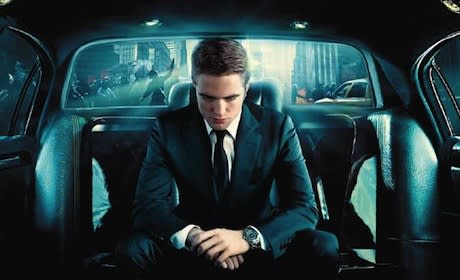Cosmopolis (Don DeLillo's pseudo-prescient 2003 novella deconstructing the dot-com bubble burst) is, in essence, a series of highly dramatized conversations between a young millionaire and a variety of cipher archetypes intended to verbalize the compounding ethos of the time. Told from within a slow-moving limousine stocked with advanced technological gizmos and every feasible convenience, the vantage point is that of sheltered excess, removed from the chaos literally unfolding around him — protests, riots and murders — even though, in concept, his gross acquisition and financial hoarding are the impetus behind the surrounding anarchy. Cronenberg's adaptation is ostensibly the same deal, right down to much of the language and phrasing — the script took Cronenberg just six days to write — only with the modern Wall Street crash providing current context. Commenting on the nature of instant wealth — self-consciously casting teen heartthrob Robert Pattinson in the role of Eric Packer, the tightly wound, indulgent poseur millionaire with an asymmetrical prostate — this highly stylized conversation piece juxtaposes his reactive appropriation of intellectual and fiscal property with varying social signifiers. Each signifier, embodied by a different actor — Juliette Binoche as a vessel of art commodification, Samantha Morton as the voice of anarchic principle and so on — helps define and shape Eric's world. Unfortunately, regardless of the many deliberate juxtapositions and use of prurience as a trajectory to reiterate the self-serving nature of capitalist indulgence, this series of tonally disconnected monologues comes across with little more than glib undergraduate smugness. Even though the concepts presented are rather broad, rudimentary and, at times, redundant, they're presented with a cool condescension that alienates more so than it engages intellectually. In the two-hour "making of" documentary included with the Cosmopolis Blu-Ray, the tonal inconsistency and feeling of disconnectedness are indirectly addressed, with each actor discussing what it was like to work on a film for a short time with no preparation or character analysis with their director. Cronenberg assembled the film from a distance, watching shot set-ups from a monitor in his trailer and leaving the actors to "find their characters" on their own. There's also discussion about his first outing with digital video rather than film, in addition to his simplification of coverage, wherein very few shots were taken of each scene for editors to choose from. While the documentary is handled objectively, mixing interviews and behind-the-scenes and film footage in a chronological manner, there's a sense that Cronenberg is on autopilot. His loose, "let the story and the tone work itself out" direction is apparent while watching the movie; it seems perpetually "off." In a sense, Julie Ng's supplemental doc is more engaging than its subject, providing some insight on a director reaching a point in his career where ego and assumption might be getting the better of him, which is a shame, since his works, up until Cosmopolis, have been almost uniformly superlative.
(eOne)Cosmopolis [Blu-Ray]
David Cronenberg

BY Robert BellPublished Jan 4, 2013